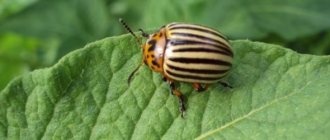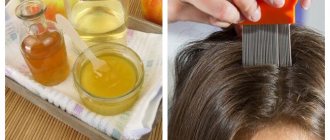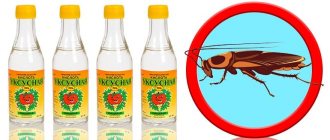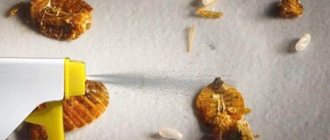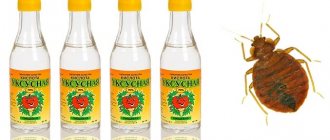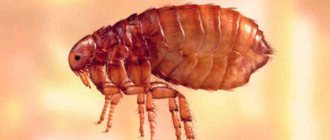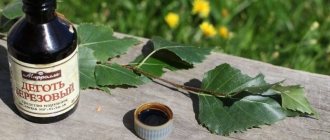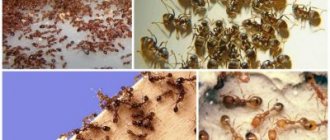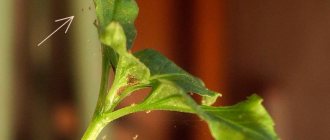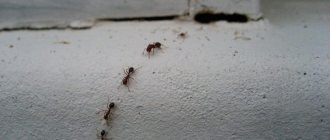Hello, dear readers! Aphids are a frequent headache for gardeners, because this ubiquitous pest not only drinks all the juices from plants and crops, but also carries all kinds of infections throughout the area.
Methods of fighting insects are very different, but all of them are complicated by the literally cosmic rate of pest reproduction. Vinegar can help against aphids, and I will tell you how to use it correctly in my article.
From drought
Using a vinegar solution you can get rid of drought. You need to take 10 liters of water and dilute 300 ml of 9% vinegar in it. Add another 20-30 ml of ammonia to this mixture. The resulting solution, ammonium acetate, will no longer be acidic due to chemical reactions.
Ammonium acetate is a source of energy for various microorganisms and plants, and it is quickly and easily absorbed.
One plant will need half a liter. This solution works as a top dressing and is suitable for all major garden crops.
Using vinegar to control aphids
The pest can be destroyed mechanically - by washing it off with water or removing it with your hands, but such methods are ineffective. You can resort to the help of insects and birds that eat it. To do this, place feeders in the garden and sow herbs that attract beneficial insects. It will be possible to defeat the pest using various drugs to destroy it. There are special chemicals - Strela, Fitoverm, Intovir and other drugs. However, they are expensive and toxic, and special means may not always be at hand.
Vinegar can be used for the same purposes. It is absolutely safe, and due to its low cost, it is accessible. The natural product does not affect the development of the plant and does not require special skills when spraying.
Boric acid solution for spraying tomatoes We grow crops in the country in order to obtain environmentally friendly products. Such vegetables and fruits have an impact on…
Solutions using acetic acid are suitable for spraying fruit trees, currant bushes, cucumbers, tomatoes, cabbage, peppers, dill, and for treating flowers. Spraying should be carried out at intervals of 3-7 days, then as needed. In most cases, it is enough to process the crops once every 3 weeks. In addition, vinegar can fully replace fungicides. This is the prevention and treatment of fungal plant diseases.
Improving seed germination
Vinegar will help speed up seed germination by about half. To do this, you need to dilute it in water in a ratio of 1:9. Soak pieces of gauze or cloth in this solution. The seeds that you want to germinate should be wrapped in a wet cloth.
For greens, for example, parsley and dill, as well as carrots and other similar crops, one day is enough. For peppers, tomatoes and eggplants, 12 hours is enough. For zucchini, cucumber and pumpkin seeds, only 7-8 hours is enough. After removing from the cloth or gauze, the seeds should be dried a little, and then planted.
In addition, a vinegar solution improves the flowering of azaleas, hydrangeas and some other plants that prefer acidic soil.
To prepare such a solution, you need to take 100-120 ml of vinegar per 10 liters of water. The prepared solution should be watered at the roots about one month before flowering begins, every 7-10 days. Watering should be stopped when flowers appear.
Vinegar as an ingredient in rodent repellent
If your dacha is often visited by field hares and mice, who come running to eat something tasty from the surrounding meadows and fields, it makes sense to prepare traps for them. However, these are not entirely traps. These are rather repellers that will discourage rodents from your area.
Algorithm for preparing a trap
- We take an old cotton towel or unnecessary scraps of natural fabric.
- Soak the pieces of fabric in undiluted apple cider vinegar for two to three hours.
- We place rags soaked in vinegar near the places through which rodents usually get into the area. Or along the entire perimeter, securing the flaps with pebbles so that the wind does not blow them away.
Be sure that a field visitor, smelling the smell of apple cider vinegar, will prefer to take the tenth route around your site.
From aphids on cucumbers
The essence will protect plants from many pests: the Colorado potato beetle, caterpillars, ants, flies and aphids.
The pungent smell of vinegar repels insects, creating unfavorable living conditions for them and forcing them to leave in search of a better place.
To prepare the solution, dilute 150 ml of vinegar in one bucket of water and then spray the affected plants.
Vinegar as a poison for fruit flies
Fruit flies are a real punishment for the housewife. In the summer, when the weather is hot, these small insects seem to come from everywhere. To destroy them, you need to prepare a special bait based on granulated sugar, molasses and vinegar.
Bait recipe
- Take a glass of water.
- Add half a glass of apple cider vinegar there.
- Pour a quarter cup of granulated sugar in there.
- Add a tablespoon of molasses to the mixture and mix everything thoroughly.
- We fill unnecessary tin containers with the resulting mixture and place them on kitchen surfaces.
If there are flies in the garden, then similar devices can and should be hung on the branches of fruit and berry trees. But only so that the traps are located at the level of fruit ripening.
Flies, which will certainly be attracted by the aroma of artificial nectar, will flock to the smell and die in the viscous liquid.
Disinfection of premises
Vinegar also helps disinfect rooms, namely, get rid of mold. In one application it can remove up to 80% of mold.
You can only use a 9% vinegar solution for cleaning, but it is more effective when mixed with other ingredients.
For example, you can mix 100 ml of water, 50 ml of hydrogen peroxide and 50 ml of vinegar. For greater efficiency, the solution can be boiled to +50…+70°C before use. This increase in temperature improves the interaction of substances, which helps to quickly eliminate the fungus.
Vinegar as a cleaning agent for garden tools
Over time, all garden tools made of metal begin to rust. Something more, something less - but not a single metal tool can resist corrosion. However, an experienced summer resident knows very well that equipment can be saved from certain death with the help of vinegar. How exactly? The answer to this question depends on the extent of damage to shovels, forks and rakes.
- If the corrosion is not severe , just fill a spray bottle with apple cider vinegar, spray the product over the surface of the tools, and then use a clean soft cloth to remove the solution from the metal surface.
- If the tools are very rusty , you need to fill a closed container with vinegar, dip the equipment in the solution and leave it in this position for 24 hours. After the specified amount of time, shovels and rakes must be removed from the vinegar and wiped dry with a soft cloth.
From weeds
The essence will help to effectively fight weeds and, after one treatment of the beds, get rid of unnecessary vegetation in the beds for a long time.
To prepare this solution, boil 1 liter of water, then add 75 ml of vinegar, 40 g of salt and 1 tbsp. l. liquid soap. Allow the solution to cool before spraying. And during processing, carefully ensure that it does not get on the desired plants.
Fighting slugs
Last summer, small gray slugs completely took over our area. They quickly felt like masters both in the greenhouse and throughout the garden plot. In the morning, in sunny weather, their silvery traces were clearly visible everywhere (on the plants and on the path).
Apple cider vinegar helped partially cope with them. First, we made traps out of old boards in shaded, damp corners. During the day, many slugs hid from direct sunlight there. We picked them or sprayed apple cider vinegar on them.
Affected and healthy plants (the latter for preventive purposes) were sprayed in the evenings with 6% apple cider vinegar dissolved in water at a concentration of 1 to 3. Additionally, a small amount of liquid soap was added to the composition (it adds stickiness).
This composition will also repel other pests.
Vinegar for first aid
Vinegar is a good remedy. Therefore, you should put it in your country medicine cabinet. He will help you out in unexpected situations.
If after gardening your muscles and bones hurt, then pour half a glass of water and add a tablespoon of vinegar. Mix the ingredients. Soak a piece of natural material in the solution and apply to the sore spot for half an hour. This compress will quickly relieve your pain.
Apple cider vinegar will help you with a sore throat. Dissolve a teaspoon of the product in half a glass of water. Use the prepared gargle every 1.5 hours.
After working in the garden, the skin often cracks. To soften the epidermis, mix equal parts of apple cider vinegar and hand cream. Rub this product into your skin before going to bed.
Determination of acidity
To get a good harvest, a summer resident needs to know the acidity of the soil. You can determine it with vinegar.
Take a soil sample from a depth of 30 cm. Place the soil on a wooden surface or cling film. Pour vinegar onto the ground and watch the chemical reaction.
Active formation of bubbles is a sign of an alkaline environment. If you hear only a slight hiss, this indicates a neutral ground reaction. If the soil acidity is high, the reaction is completely absent.
Using sunflower oil to repel aphids
Most often, aphids attack young apple and plum trees. Insects are clearly visible on them. Therefore, pests can be detected in a timely manner and measures can be taken. To drive aphids away from fruit trees, you must perform the following steps. Fill a ten-liter bucket halfway with water. Pour half a glass of sunflower oil into it. This solution must be sprayed on the places on the tree where the greatest concentration of pests is. The procedure must be repeated daily until the pests completely disappear.
Causes of defeat
The appearance of aphids on cucumbers may be due to favorable climatic conditions in the region (air temperature +22-23 ° C, humidity at 80%), failure to maintain the planting density of cucumbers, and the presence of weeds where parasites lay overwintering eggs.
Another reason for the appearance of aphids on cucumbers is ants . They contribute to the spread of pests, as they feed on their sweet liquid secretions and protect colonies of pests from insect predators. For the winter, they hide the aphids from the cold in an anthill, and in the spring, with the onset of warmth, they transfer them to the plant.
Vinegar as a pottery cleaner
Perhaps today, cleaning pottery from carbon deposits is no longer relevant for many, but some summer residents, who have a Russian stove in their house, still use the old-fashioned pots that they inherited from their great-grandmothers. It’s not without reason that they say that cabbage soup and porridge are much tastier in makitra than in an ordinary fashionable stainless steel pan. One bad thing: pots tend to get dirty. The reason is the accumulation of soot. True, if you have vinegar in your household, you are not afraid of any soot.
Cleaning algorithm
- Dilute a glass of vinegar with a liter of water.
- Dip the pot or other earthenware into the prepared product.
- We wait for the liquid to be absorbed into the clay surface.
- Carefully wash off the product with a damp cloth.
If this does not help because the clay pot is too dirty, do not dilute apple cider vinegar with water. Instead, use pure 6% table apple cider vinegar as a cleaning agent.
Repelling and catching pests
The smell of acetic acid is pungent, pungent and unpleasant to ants and rodents. A natural remedy will scare away unwanted guests. Spraying the liquid evenly around the burrows and passages will force the pests to leave the area.
And those who are attracted by the aroma of apple cider vinegar can be caught in traps. To make bait you only need vinegar essence, plastic bottles and wire.
- The neck of the bottle is cut off and, turning over, is inserted inside the remaining part.
- The structure is secured with staples or tape from the outside.
- Two holes are made in the upper part. A wire is pulled through them. It will serve as a handle holder.
- Vinegar is poured inside the trap and hung on fruit trees.
Such a mechanism will not allow any moths and other insects caught to get out.
5 recipes using baking soda and vinegar for home disinfection
Destruction of dandelions
Weed control is one of the most important problems for any summer resident, because dandelions and other weeds appear literally everywhere. Try watering them with water mixed with vinegar. You can also place a cotton swab soaked in acid under the plant.
This caustic substance will gradually lead to the destruction of the root system and the death of unwanted plants. A few treatments are enough to achieve noticeable results. A homemade herbicide will work especially quickly on young plants with tender roots.
What kind of insect is an aphid, and how is it dangerous for cucumbers?
Aphids are a superfamily of insects from the order Hemiptera . More than 4,000 species are known, of which almost 1,000 live in Europe. The appearance and spread is possible with any method of growing cucumbers: in spring in greenhouses and greenhouses, in summer in open ground.
Favorable conditions for the reproduction of parasites are regions with a humid, warm climate . However, pests are resistant to weather conditions: they can exist and reproduce in a wide range of temperatures and at different air humidity.
Aphids feed on plant sap, infecting all its above-ground parts: flowers, leaves, ovaries, fruits, and are capable of spreading viruses and causing pathological formations (galls) in plants. Galls weaken the plant, slow down fruiting, and can lead to its death and, accordingly, loss of harvest.
For reference. You can protect your plantings by choosing the right cucumber variety that is resistant to pests and diseases.
What kind of aphid infects cucumbers?
The main pest of cucumbers is the melon or cotton aphid . This is a small insect, body length is 1-2 mm. Some individuals reach 5 mm. The species contains winged and wingless forms. The body color is different, ranging from light yellow to rich green, almost black. Each individual has a proboscis with which it pierces the surface of leaves and shoots.
The development of melon aphids begins in the spring , when the larvae hatch from eggs laid on the host plant in the autumn. The larva feeds on the sap of the plant, and after molting it begins to reproduce. During the summer, one female reproduces more than 10 times; more than 500 individuals of winged and wingless forms can appear from her. In autumn, winged females fly to a weed plant, where they begin laying eggs for the winter.
Interesting. Insects lead a sedentary lifestyle, but move quite quickly. Winged individuals can travel long distances and create colonies in new places.
Smoking aphids from the greenhouse
Aphids can grow on plants not only in the garden, but also in greenhouses or greenhouses. In this case, there are even more problems with processing, since the sprayed products are more concentrated and accumulate in the air. In addition, it is inconvenient to treat each plant indoors, so I smoke the aphids with a special smoke.
To prepare, you need to take any canned food or coffee can and make several holes in its bottom. In a prepared container, light a small fire from dry wood chips, and then cover it with tobacco dust. After these actions, thick white smoke will pour out of the container. At the end of the procedure, you need to tightly close the doors and vents in the greenhouse for ventilation. After two hours, the room will be completely filled with smoke, but in order for the aphids to leave, I recommend leaving the greenhouse for another 2-3 hours without ventilation.
Cleaning tools from rust
Anyone who has at least once encountered metal corrosion knows that getting rid of it is not so easy. However, soaking the tool in acetic acid will help make physical labor easier. Pour it into a bowl and leave the damaged equipment to soak overnight.
By morning, the removal of corrosion will be much easier during cleaning.
Useful folk advice is always environmentally friendly and effective. They have been tested over the years and are used by many people. Before you take on toxic substances in your summer cottage, you should try to minimize the harm and resort to safe methods of solving the problem.
Vinegar as a growth stimulant
If you are seriously involved in gardening and gardening, you have probably heard about such drugs as growth stimulants. These chemical industry products help seeds germinate faster, accelerate the natural processes of growth and development, and have a positive effect on the amount of harvest. If, of course, you know how to use these stimulants correctly. But what’s interesting is that you don’t have to buy the drug at a garden center or specialty store. You can use regular table vinegar instead as an effective alternative.
If you need to quickly and efficiently process your seeds before sending them into the ground, be sure to use the algorithm described below.
What we do
- Take one part of 9% table vinegar and mix it with nine parts of plain water.
- Thoroughly moisten the bandage folded several times in the prepared vinegar solution.
- We wrap the seeds in wet gauze and keep them in it for a certain amount of time.
- We unfold the gauze, place the seeds on a saucer and lightly dry the surface of the seeds in fresh air, after which we sow.
There is no universal answer to the question of how long to keep seeds in gauze soaked in vinegar. It all depends on what kind of seeds you wrapped in a bandage folded several times.
- Parsnips, parsley, dill - the seeds of these plants must be soaked for 48 hours.
- Carrots, eggplants, tomatoes, peppers - the seeds of these vegetable crops are soaked for 24 hours.
- Zucchini, pumpkin, cucumber - the seeds of these plants need to be soaked for seven to eight hours.
What are the advantages of the product
Today, several methods of controlling aphids are known. Some prefer the quick and dangerous chemical one, others are ready to be patient and use folk remedies. And among the latter, vinegar solution is one of the most popular.
What makes such a product in demand? It has many advantages:
- a large amount of acids;
- efficiency of impact.
Whatever vinegar you choose: lemon, apple, grape or essence, the effect will be sure. The only condition for a correctly formulated product is the proportion of the product in the working solution.
This composition literally burns small insects without giving them any chance. But you need to remember that undiluted vinegar will burn your roses. Therefore, it is imperative to follow certain rules for preparing the solution and the proportions of the components.
Another advantage of the vinegar product is its safety for humans. Even if you treat trees or berry bushes with this composition, you can harvest the crop within a few hours after spraying. No other chemical product can boast of this.
Vinegar as protection against mosquitoes
Insects are a scourge not only for garden crops, but also for the gardener himself. In the summer heat, the gardener is attacked by horseflies. When going for berries and mushrooms - ticks. And in the evening, when the heat subsides a little, all the previous bloodsuckers are replaced by annoying mosquitoes, from which it seems impossible to hide or escape. But it turns out that saving yourself from insects is quite simple. It is enough to spray apple cider vinegar from a spray bottle on bare areas of the body. True, the spray bottle itself should not be removed far. After about ¾ of an hour, the effect of the product will end, the vinegar will disappear - and the protection will have to be applied again.
Of course, apple cider vinegar is not the most modern drug for fighting bloodsuckers. But you don’t always have repellent on hand, but vinegar is definitely available at every dacha.
Plant treatment
Bacterial diseases on the surface of the stems and bark of plantings are not a rare occurrence. Affected areas must be removed to prevent the spread of the disease. And the branches and stems of plants growing nearby that have not succumbed to the influence of harmful microorganisms should be treated with water and vinegar. To 3 parts of water add 2 parts of acid.
The acidic properties of the essence have a depressing effect on fungal spores. Fungistatic and antimicrobial effects ensure the death of the pathogenic colony.
Eggshell flour for strong seedlings: how to make and use correctly
How to prepare a solution with soap
It is not always possible to achieve results in the fight against pests with just water and vinegar. This method is best carried out as a preventive measure in early spring. Or with a small accumulation of aphids on roses.
Acetic acid as part of the working solution component is also used in a more productive recipe. It also uses soap. In general, few home remedies for aphids are prepared without this product. The best type of soap is:
- economic;
- tar.
But you can also buy a special one in the store - green. It is an insecticide in itself, and together with acetic acid it creates an excellent solution for pest control. Soap gives the composition sticky properties, preventing aphids from escaping from the poison. In addition, this product has bactericidal and antibacterial properties.
To prepare such a solution, it is enough to place 300 grams of shavings or liquid product in a bucket with the working solution. Everything mixes well and, in principle, you can spray the rose bushes.
Treatment and prevention of fungal infections
Many plants are susceptible to infection by fungal diseases. Acetic acid is an excellent disinfectant. It suppresses the growth of fungi. These microorganisms die in an acidic environment.
Pour half a cup of vinegar into a 10-liter bucket of water. Spray affected plants with this mixture once a week. The following plants can be treated for fungus with this remedy:
The skin of the face will say “Thank you”: why it is better to replace terry towels with paper ones
Presenter Ivan Urgant was offered to try himself as a political educator
Russian tourists will be allowed into Cyprus without quarantine
- cucumbers;
- zucchini;
- tomatoes;
- fruit bushes and trees.
If you spray healthy plants to prevent fungus, the treatment should be carried out once every 2 weeks.
Soil acid-base balance
Most plants can adapt to any type of soil in which they grow. However, yields and growth rates may vary significantly.
Stone fruit plants, cucumbers, garlic, carrots, and raspberries love a slightly alkaline environment. They feel comfortable on it. Potatoes, tomatoes and melons are best placed in a slightly acidic area.
To easily determine the type of soil, just pour a little vinegar onto a handful of soil. If it enters into an active reaction, bubbles begin to form, this will mean the predominance of acidity.
Vinegar for attracting pest butterflies
Caterpillars cause serious damage to both the garden and vegetable garden. Their appearance can be prevented by preventing the butterflies from laying eggs. The best assistant in this difficult task is apple cider vinegar. Dilute it with water 1 to 10 and pour the resulting solution into suitable containers. Distribute the jars or bottles throughout the garden. The smell will attract insects, and the butterflies will drown in the liquid without having time to give birth.
Important! Always make several baits to cover the entire area. Choose places for installation that are especially popular with insects.
Don’t leave traps unattended; check them periodically. If there are few butterflies, reweigh them or move them to another place. Change the contents about once a week. Do this more often if there are a lot of insects packed inside.
Experienced gardeners claim that this simple method increases the safety of the crop to almost 100 percent. Considering the meager costs, this is an excellent method.
